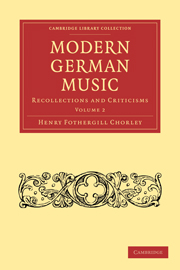Book contents
- Frontmatter
- Contents
- WEIMAR AND LEIPSIC
- DR. SPOHR'S MUSIC
- A GLANCE AT VIENNA
- CHAP. I Traditions of Vienna
- CHAP. II Down the Danube
- CHAP. III Autumn Musicand Dancing
- CHAP. IV The Leopoldstadt Theatre and Mozart
- CHAP. V Austrian Influences on Art
- CHAP. VI Schubert and his Music
- MUSIC IN THE RHINE LAND
- THE LAST DAYS OF MENDELSSOHN
CHAP. I - Traditions of Vienna
Published online by Cambridge University Press: 07 September 2010
- Frontmatter
- Contents
- WEIMAR AND LEIPSIC
- DR. SPOHR'S MUSIC
- A GLANCE AT VIENNA
- CHAP. I Traditions of Vienna
- CHAP. II Down the Danube
- CHAP. III Autumn Musicand Dancing
- CHAP. IV The Leopoldstadt Theatre and Mozart
- CHAP. V Austrian Influences on Art
- CHAP. VI Schubert and his Music
- MUSIC IN THE RHINE LAND
- THE LAST DAYS OF MENDELSSOHN
Summary
There is no lover of art to whom the name of Vienna has not been a spell of power from his youth upwards. The capital that could attract and retain Haydn, Mozart, and Beethoven, will, by many, be exalted as the first musical shrine that should be sought by the holiday pilgrim.
But the objects of pilgrimage are different. To some it will be the past–to some the future.
I had long believed that Vienna must be a place with a musical past chiefly; for the musical present, which consists merely in a constant repetition of favourite works by favourite masters, and which does nothing in nurture of fresh creative art, is, after all, only a past prolonged– leading to nothing, and implying as much mechanical tradition as real reverence. The poet has finely said–
“We do not serve the dead–the past is past.
God lives, and lifts his glorious mornings up
Before the eyes of men, who wake at last,
And put away the meats they used to sup,
And on the dry dust of the ground outcast
The dregs remaining of the ancient cup,
And turn to wakeful prayer and worthy act.”
The test of art being in a flourishing state, is not appreciation only, it is also production. Compare the average gains of the musician in the present day with what they were in 1772, when Burney visited Vienna!–count the profits now derived from popular sympathy,–and then consider the comparative pittance at that period bestowed on the artist of genius by the princely patronage to which he was obliged to look for his reward.
- Type
- Chapter
- Information
- Modern German MusicRecollections and Criticisms, pp. 99 - 109Publisher: Cambridge University PressPrint publication year: 2009First published in: 1854



